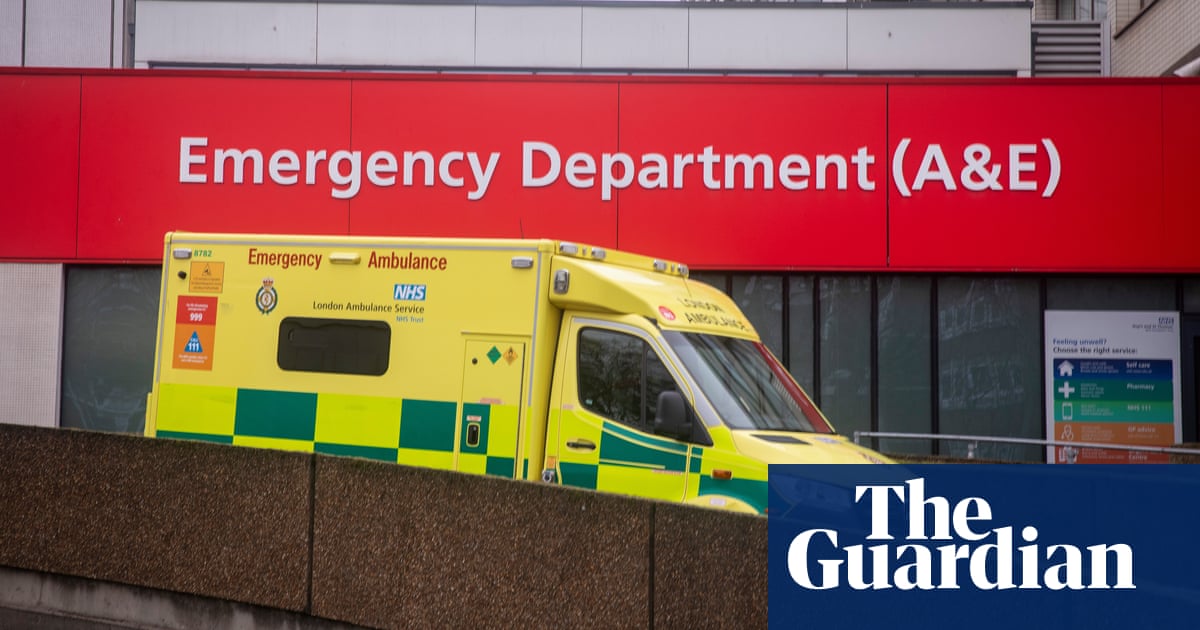
Public satisfaction with the NHS is at a record low and dissatisfaction is at its highest, with the deepest discontent about A&E, GP and dental care.
Just 21% of adults in Britain are satisfied with how the health service runs, down from 24% a year before, while 59% are dissatisfied, up from 52%, the latest annual survey of patients found.
Satisfaction has fallen dramatically from the 70% recorded in 2010, the year the last Labour government left office, and the 60% found in 2019, the year before the Covid-19 pandemic.
Mark Dayan, a policy analyst at the Nuffield Trust thinktank, which analysed the data alongside the King’s Fund, said the years since 2019 have seen “a startling collapse in NHS satisfaction.
“It is by far the most dramatic loss of confidence in how the NHS runs that we have seen in 40 years of this survey.”
A&E is the NHS service the public is least happy about. Satisfaction fell from 31% in 2023 to just 19% last year – the lowest proportion in the 41 years the British Social Attitudes (BSA) survey of the views of patients in England, Scotland and Wales has been carried out.
Satisfaction with NHS dentistry has collapsed, too, from 60% as recently as 2019 to just 20% last year. More people (55%) are dissatisfied with dental care than with any other service.
Similarly, fewer than a third (31%) of adults are satisfied with GP services.
“The latest results lay bare the extent of the problems faced by the NHS and the size of the challenge for the government”, said Dan Wellings, a senior fellow at the King’s Fund. “For too many people, the NHS has become too difficult to access. How can you be satisfied with a service you can’t get into?”
The collapse in satisfaction from 70% to 21% in 14 years had been “extraordinary”, he said, adding that people should not be scared about going to A&E, or that an ambulance will not come quickly after dialling 999 or that they may have to get themselves to hospital some other way. “People are sad and angry at the place we’ve got to.”
A generational divide is also emerging. Over-65s are more likely to be satisfied, though the figure is still only 27%. But satisfaction among under-65s has fallen from 24% to just 19%.
More positively, a narrow majority (51%) are satisfied with the quality of the NHS care they receive when they manage to access services. And there remains overwhelming support for its founding principle that it should be available to everyone free at the point of use and funded through taxation.
Wes Streeting, the health and social care secretary, said: “We inherited a broken NHS and this survey shows patients agree. Ever-longer waiting lists, widespread corridor treatment and a regular struggle to see your GP have led to these record levels of dissatisfaction with the health service.”
Since the survey was undertaken in September and October, the government had “taken the NHS off life support”, pledged an extra £26bn in investment over the next two years and was drawing up a 10-year plan to make the service once again “fit for the future”, he added.
Meanwhile, a separate study has found that almost one in 10 (9.7%) people in Britain have been harmed by either NHS treatment or a delay in obtaining help in the past three years.
In 45% of cases, the harm the person suffered had a severe impact and in 38% of cases a moderate impact.
But those from disadvantaged groups – such as people with a disability, from poorer backgrounds or with a long-term health condition – were more likely to be harmed and suffer serious harm.
Researchers, whose findings are published on Wednesday in the journal BMJ Quality and Safety, surveyed more than 10,000 people in Britain between November 2021 and May 2022.
They were asked about their experience of NHS adverse events, which included the medical or physical consequences of treatment, and also the psychological damage involved and harm caused by lack of access to care.
“Our study confirms that disparities in rates of NHS harm for socially disadvantaged groups exist and impacts are more severe,” said Dr Michele Peters, an associate professor at Oxford Population Health and an author of the study.
“These groups may find it harder to have their needs met within a difficult-to-navigate system with a culture that is less able to hear more vulnerable people.”








